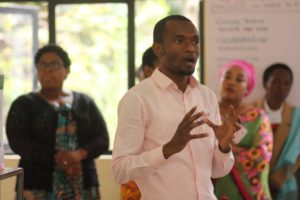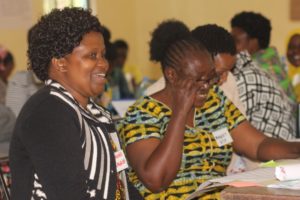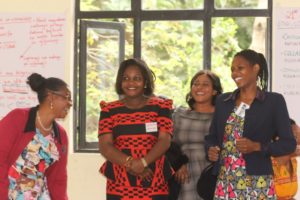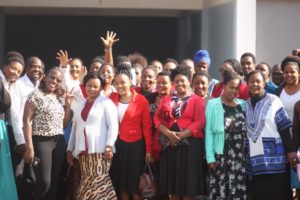
October 2, 2020
Bit by bit we treaded, as if putting stones and concrete together to make pillars. The trainees were excited and enthusiastic yet as timid as a rabbit, on training day one. The trainee group mainly consisted of teachers, a few members of the School Quality Assurance team (SQAT) and the Ward Education Committee (WEC). Facilitators comprised the Teacher Training team, two co-facilitators from the scholarship team, and a teacher resource center coordinator.

By the time we took the first tea break, everyone was all smiles, busy mingling and loudly laughing at jokes. I hadn’t imagined what this warmth would lead to, it set a whole different pace and ambience that kept us clinging to each other and taking endless photos at the end of the training on day five.

Facilitated in both English and Swahili, the trainees enjoyed the switch and swap from one language to another, helping them to both learn more vocabulary and understand better.
Hanging on the walls of the training room were pre-planned posters, highlighting key takeaways for every section, serving as a constant reminder of what was covered by the day.The sessions were participatory facilitated, gearing trainees towards getting hands-on micro teaching methodology experience. They worked in both small and large groups, finding solutions to tasks and working together to solve given paradoxes. Group members were mixed, made up of teachers from different schools, a member of the SQAT team and one member of the WEC. This made the discussions more energetic and resourceful, as there was a lot of knowledge and experiences to share.
Equipped with a projector and well-arranged slides of the whole training manual, the facilitators played more of a guiding role. This interested the trainees so much and they were amazed at how much fun and less hectic teaching can be if one deploys a student centered and participatory learning approach in their daily teaching.

Among the key methods that we kept referring to were 21st century skills. The training pivoted around the need for teachers to change their teaching, in consideration of the changing world today and integrate the 4Cs (critical thinking, creativity, communication and collaboration) in their planning and teaching. The focus on this is to make teaching more competence-based other than knowledge-based. The former gears towards producing more competent pupils, who can favorably compete with others in this extremely changing, globalized world, unlike the latter.
Running this training was a thrill for both parties. The teachers wished we could make it longer than five days so that they could learn more, and so did the facilitators so that our impact could be felt more. They echoed the need for more such training sessions, requesting TFFT to widen the coverage so as to spread this knowledge and provide expertise to as many schools in the country as possible and in the long run creating a rich investment in youth, thus building a stronger nation.
The more we empower the teachers, the stronger pillars they become to support the children and the nation of tomorrow.
